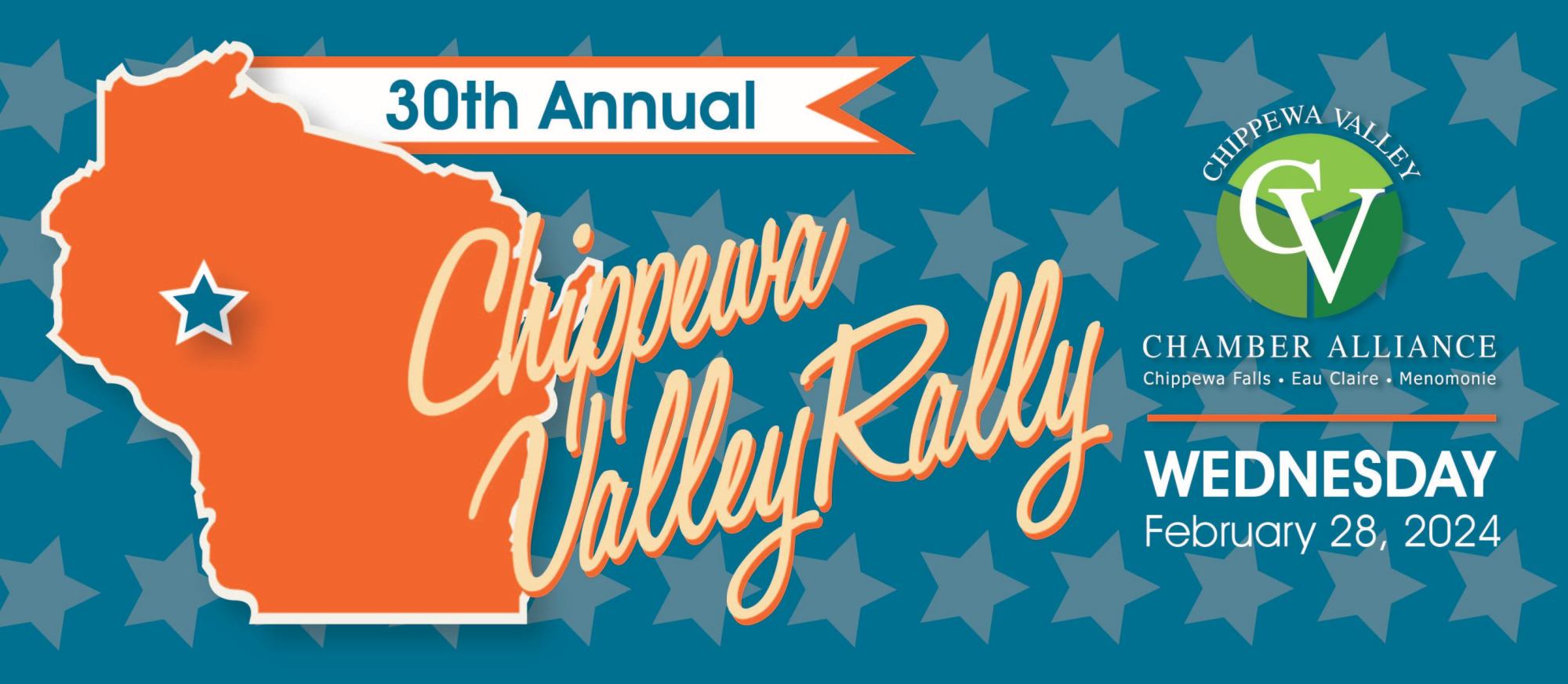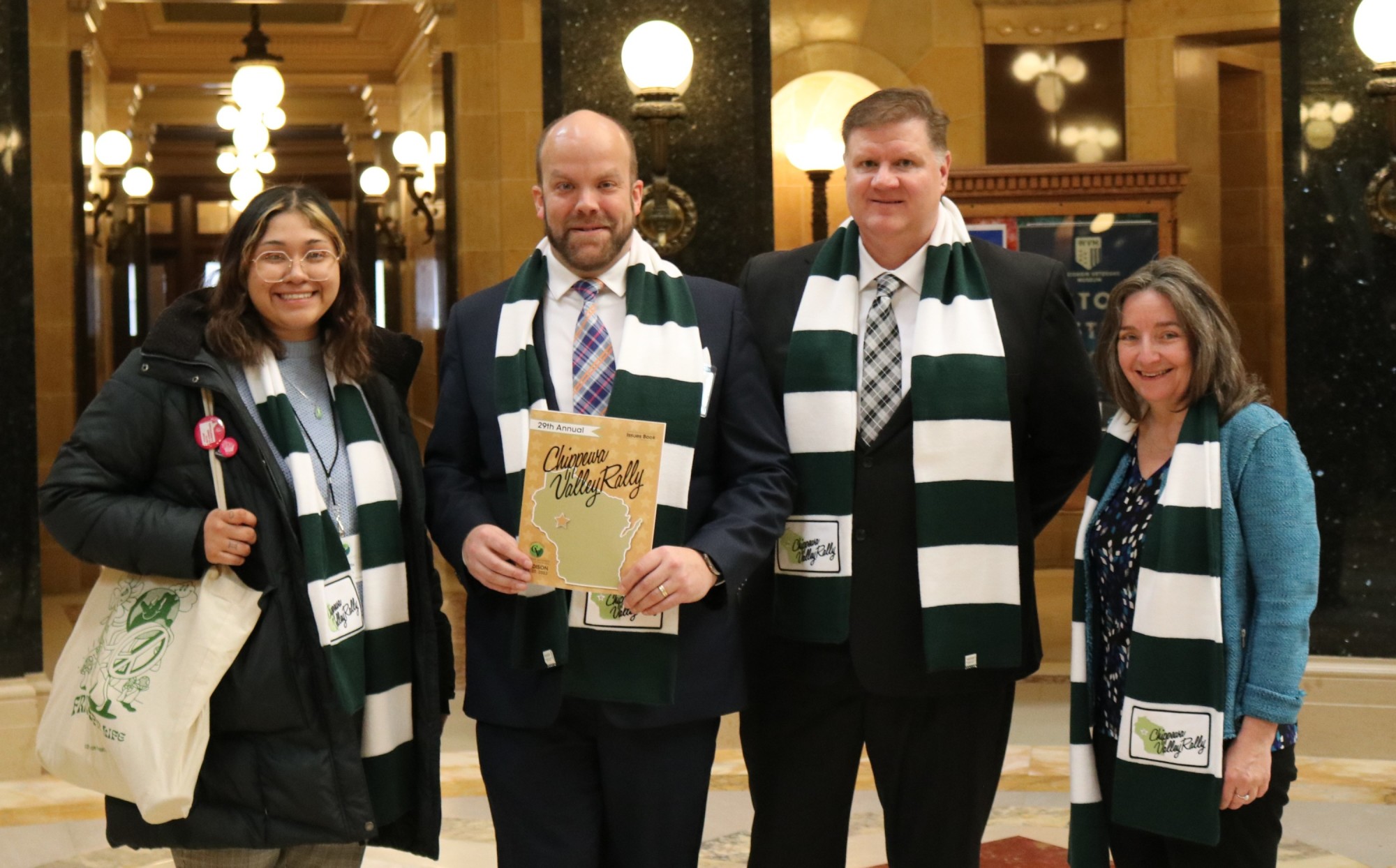|
{{CFirstName}}, you are receiving this e-newsletter because you have attended a previous Chippewa Valley Rally or shown interest in regional economic policy issues. Contact us if you don't want to receive future issues. |
|
30th Chippewa Valley Rally, Update 1, Dec 19, 2023 |
|
|
|
Issues Update: Chippewa Valley Rally |
|
|
Above: Participants gather in the Capitol Rotunda at the 2023 Chippewa Valley Rally |
|
|
|
|
|
|
UWEC Science & Health Sciences (L) and Stout Heritage Hall (R) renderings. Both projects were 2023 Rally priorities and were funded in the 2023-25 State Budget. |
|
|
|
2023 Chippewa Valley Rally Issues Statements
Status: Although the state budget initially included individual income tax cuts for all four of the state’s tax brackets, the governor vetoed the cut for the top two. This means the state is projected to have a $4 billion surplus at the end of the 2024-25 fiscal year. The legislature subsequently passed a $2 billion "middle class tax cut" as part of a bill that originally was introduced through the Governor's call for a special session on childcare in September, but which was substantially reworked to instead create a child care tax credit, the tax cut, and other provisions. The Governor vetoed the bill on November 20.
Address the squeeze on local governments and outdated funding formulas
Status: The 2023-2025 Wisconsin State Budget includes an increase to the shared revenue formula. Counties and municipalities will now see a minimum 20% increase. This was done in part by dedicating 1/5 of the state’s sales tax revenue for local aid. The budget also repealed the personal property tax. |
|
|
|
|
|
|
A 2023 Rally team in the State Capitol. |
|
2023 Chippewa Valley Rally Issues Statements
Status: In the budget, the legislature included a requirement that the Wisconsin Economic Development Corporation (WEDC) expend at least $4 million from its existing appropriations on workforce attraction and retention initiatives, including at least $2 million to attract and retain veterans. This provision was vetoed by the Governor.
Address housing supply and affordability
Status: The state budget includes $525 million toward affordable housing. 5 bipartisan bills addressing affordable housing were also signed by Governor Evers as part of the budget. Assembly Bills 264-268 include: creating a residential housing infrastructure revolving loan fund program, creating a main street housing rehabilitation revolving loan fund program, limit residents’ ability to block new housing projects, and creating a loan program for developers converting commercial buildings into residential ones.
Address the childcare crisis
Status: The Governor, Democrats, and Republicans have not come together for any compromise in the childcare area.
The state budget did not include any funding for Child Care Counts. The governor called a special session on Sept. 20 and requested $340 million to continue the Child Care Counts program. The legislature took up the bill, but substantial reworked it without proving the Governor's requested funding. On October 16, the Governor directed $170 million in federal funding to the Child Care Counts program.
Republicans also introduced a package of child care-related bills which passed the Assembly on Sept. 14. These bills include: increasing the child to teacher ratios, decreasing age limits for child care teachers, creating a new category of large family-based day care providers, allowing those without employer-sponsored flexible spending accounts to open state-issued child care savings accounts, and creating a new renovation loan program administered by the Wisconsin Economic Development Corporation. The Governor and Democrats have so far opposed these bills.
Separately, a bill was introduced in December that creates a tax credit for employers who assist their workers with childcare services and/or expenses and is also supported by the Wisconsin Early Childcare Association. It had a hearing in the Assembly and action is pending.
Eliminate backlogs in occupational licensing and institute regular reviews of standards
Status: The state budget includes $145 million of funding to the Department and Safety and Professional Services. This includes 18 additional staffing positions, however most of these are temporary positions, spanning 2-4 years. This also includes $6 million for technological investments within the department. Organizations whose employees are subject to licensing say processing has improved, but more progress is needed.
Ready to register for 2024? |
|
|
|
|
|
|
Rally participants with Sen. Jesse James |
|
2023 Chippewa Valley Rally Issues Statements Infrastructure
Status: Although not directly included in the state budget, Wisconsin was awarded $1.055 billion for broadband from the federal government through the Broadband Equity, Access and Deployment program. 20% of this amount will be awarded by the state in the summer of 2024, through competitive grants. The rest will be awarded in 2025.
Build out electric vehicle charging infrastructure to include major highway corridors and rural areas.
Status: The state budget did not include any funding toward increasing electric vehicle charging stations, although Wisconsin is set to receive $78.5 million from the US department of Transportation through the National Electric Vehicle Infrastructure Formula Program over the next 5 years. However, with these funds it is required that customers are charged by the amount of electricity used, but current Wisconsin law states that only regulated utilities are allowed to charge by amount of electricity used. Statutory changes are needed, and a bill was introduced in the fall to address the issue. Action is pending.
Expand passenger rail service to the Chippewa Valley and other major state cities
Status: In late March, WisDOT submitted four corridor applications to the FRA, including one for potential additional Chicago-Milwaukee-Twin Cities trains via Madison and/or Eau Claire, as well as one to the Fox Cities and Green Bay. The Chippewa-St. Croix Rail Commission submitted an application to pursue an Eau Claire-Twin Cities corridor. In December, FRA announced that all five Wisconsin-based grants were funded. These studies are the first step to put Wisconsin and the Chippewa Valley in the pipeline for passenger rail expansion.
Position Wisconsin to benefit from coming federal infrastructure funding opportunities
Status: WisDOT and other entities in the state have been actively pursuing federal funding opportunities for Wisconsin infrastructure projects.
Coming soon... Issues Statements for 2024
Ready to register for 2024? |
|
|
|
|
|
|
|
|




